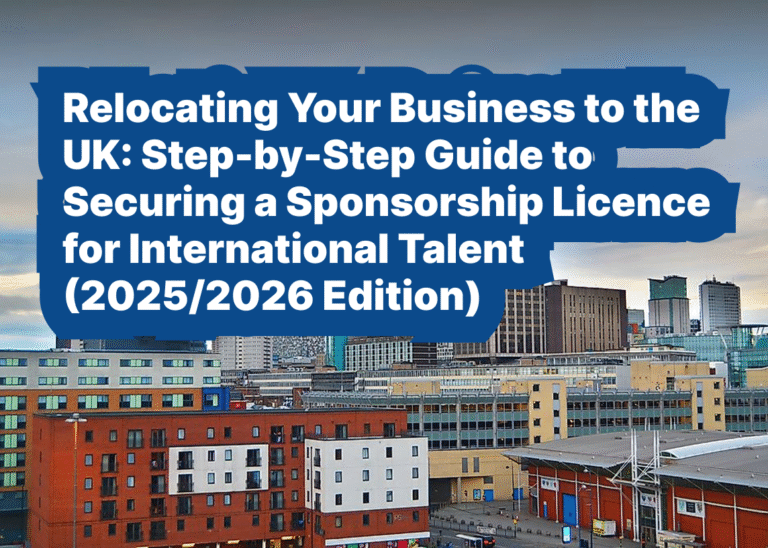Navigating the UK’s skilled visa sponsorship system can feel overwhelming, but with proper preparation and understanding of the requirements, your application can proceed smoothly. Whether you’re an employer looking to sponsor international talent or a skilled worker seeking opportunities in the UK, this comprehensive guide will walk you through every essential step of the process.
The UK’s points-based immigration system has transformed how skilled workers enter the country, making sponsorship a crucial pathway for international professionals. Understanding the intricacies of this system is vital for ensuring your application succeeds on the first attempt, saving time, money, and potential disappointment.
Understanding the UK Skilled Worker Visa Framework
The Skilled Worker visa replaced the Tier 2 (General) work visa in December 2020, introducing a more flexible points-based system. This visa allows skilled workers from around the world to come to or remain in the UK to do an eligible job with an approved employer. The system is designed to attract the best global talent while ensuring that UK workers are not disadvantaged.
To qualify for sponsorship, applicants must score at least 70 points across various criteria. These points are awarded for factors such as having a job offer from an approved sponsor, meeting skill level requirements, English language proficiency, and salary thresholds. The system also includes tradeable points, allowing applicants to compensate for lower salaries in certain circumstances.
The visa is typically valid for up to 5 years and can be extended. After 5 years of continuous residence, holders may be eligible to apply for settlement (indefinite leave to remain), making this pathway particularly attractive for those seeking long-term opportunities in the UK.
Employer Requirements and Responsibilities
Before any sponsorship application can proceed, employers must obtain a sponsor licence from the UK Home Office. This licence demonstrates that the employer is a genuine organization capable of fulfilling their sponsorship duties. The application process involves providing detailed information about the company, its operations, and key personnel.
Employers must maintain comprehensive records of their sponsored employees, including monitoring their attendance, reporting any significant changes in circumstances, and ensuring compliance with visa conditions. Failure to meet these responsibilities can result in licence suspension or revocation, affecting all current and future sponsored employees.
The employer must also demonstrate that the role cannot be filled by a settled worker. While the resident labour market test has been removed for most roles, employers must still justify why they need to recruit from overseas, particularly for roles below the general salary threshold.
Key employer responsibilities include conducting right-to-work checks, maintaining accurate records, reporting changes to the Home Office within specified timeframes, and ensuring sponsored workers comply with their visa conditions. These obligations continue throughout the employee’s sponsored period.
Essential Documentation Checklist for Applicants
Gathering the correct documentation is crucial for a successful application. Start with your passport, which must be valid for the entire duration of your intended stay. Include all previous passports if they contain relevant visa or travel history that demonstrates your immigration compliance.
Your Certificate of Sponsorship (CoS) is the most critical document, issued by your sponsoring employer. This certificate contains a unique reference number and details about your job, salary, and sponsor. Verify all information on the CoS is accurate before submitting your application, as errors can lead to delays or refusals.
Educational qualifications require careful attention. You’ll need original certificates or certified copies, along with official translations if documents are not in English or Welsh. Academic qualifications must be recognized as equivalent to UK standards, which may require assessment through UK NARIC (National Academic Recognition Information Centre).
Financial documentation demonstrates your ability to support yourself in the UK. Bank statements covering the required maintenance period must show sufficient funds, typically £1,270 if your sponsor cannot certify maintenance. Statements must be from recognized financial institutions and meet specific formatting requirements.
Professional qualifications and licenses relevant to your role should be included, particularly for regulated professions. Some occupations require registration with professional bodies before you can work in the UK, so research these requirements early in your application process.
English Language Requirements and Testing
English language proficiency is mandatory for most Skilled Worker visa applications. The requirement is typically met by passing an approved English language test at B1 level (intermediate) on the Common European Framework of Reference for Languages scale.
Accepted test providers include IELTS, Trinity College London, and Pearson PTE Academic. The test must be from an approved provider and taken at an authorized test center. Online tests are generally not accepted, so ensure you book an in-person examination.
Certain applicants may be exempt from English language testing. Nationals from English-speaking countries (including the US, Canada, Australia, and New Zealand) typically don’t need to take a test. Additionally, if you have a degree taught in English and obtained in a recognized English-speaking country, you may qualify for an exemption.
Academic qualifications can also satisfy English language requirements if the degree was taught in English at a recognized institution. You’ll need to provide evidence that the course was taught in English, which may require a letter from the educational institution.
Financial Requirements and Maintenance Funds
Understanding financial requirements is crucial for application success. The standard maintenance requirement is £1,270, which must be held for at least 28 consecutive days ending no more than 31 days before your application date. This amount must be available above and beyond any money used to pay application fees.
Bank statements must clearly show your name, account details, and daily balances. Electronic statements are acceptable if they include the bank’s official stamp or letterhead. Joint accounts can be used if you’re named on the account and can prove your relationship to the primary account holder.
If your sponsor certifies maintenance on your Certificate of Sponsorship, you may be exempt from providing financial evidence. However, ensure your sponsor is aware of this responsibility and has properly certified maintenance on your CoS.
Additional funds may be required for dependents accompanying you to the UK. Each dependent requires additional maintenance funds, and their documentation must meet the same standards as the main applicant’s financial evidence.
Job Offer and Salary Thresholds
Your job offer must meet specific skill and salary requirements to qualify for sponsorship. The role must be at RQF Level 3 or above (equivalent to A-level standard) and appear on the list of eligible occupations. Your sponsor must provide detailed job descriptions demonstrating that the role meets these skill requirements.
Salary thresholds vary depending on the occupation and circumstances. The general threshold is £26,200 per year, but many roles have higher occupation-specific thresholds. New entrant rates may apply to recent graduates or those switching from other visa categories, typically set at £23,760 annually.
Some applicants can use tradeable points to compensate for salaries below the general threshold. Having a PhD relevant to the job, a PhD in STEM subjects, or working in shortage occupations can provide additional points, potentially allowing for lower salary requirements.
Healthcare surcharge payments are required for most applicants and must be paid when submitting your application. The surcharge provides access to NHS services and is calculated based on the length of your visa and whether you’re including dependents in your application.
Application Process and Timeline
The online application system requires careful attention to detail and accurate information entry. Create your application account well in advance and gather all required documents before starting the formal application process. The system allows you to save progress and return later, but don’t leave completion too close to any deadlines.
Processing times vary depending on your location and chosen service level. Standard processing typically takes 3-8 weeks from countries outside the UK, while priority services can reduce this to 1-2 weeks for an additional fee. Plan your application timeline accordingly, considering your intended start date and any notice periods required by current employers.
Biometric information must be provided as part of your application. This involves visiting a visa application center to provide fingerprints and photographs. Book your biometric appointment early, as availability can be limited in some locations.
Consider using priority or super priority services if you need a faster decision, though these come with additional costs. Evaluate whether the extra expense is justified by your circumstances and timeline requirements.
Common Pitfalls and How to Avoid Them
Many applications fail due to incomplete or incorrect documentation. Double-check all forms before submission and ensure every required document is included. Pay particular attention to document formatting requirements, as failure to meet specifications can result in applications being returned or refused.
Certificate of Sponsorship errors are surprisingly common. Verify all details on your CoS match your intended circumstances, including job title, salary, start date, and location. If you identify errors, contact your sponsor immediately to request corrections before submitting your application.
Financial documentation mistakes frequently lead to refusals. Ensure bank statements cover the full required period, show sufficient funds throughout, and meet formatting requirements. Avoid large, unexplained deposits that might raise questions about the source of funds.
English language requirements often cause confusion. Verify that your test results or qualifications meet the specific requirements for your visa category. Ensure test results are still valid at the time of application, as most have time limits.
Working with Immigration Advisors
Consider whether professional immigration advice would benefit your application. Complex cases, previous visa refusals, or unusual circumstances may warrant expert guidance. Regulated immigration advisors can provide valuable assistance in preparing applications and avoiding common pitfalls.
When selecting an advisor, verify their credentials with the Office of the Immigration Services Commissioner (OISC) or relevant professional body. Legitimate advisors will be registered and able to provide their registration details. Be wary of unregulated advisors who cannot provide legal immigration advice.
Discuss fees and services upfront to avoid misunderstandings. Reputable advisors will provide clear information about their charges and what services are included. Consider whether full representation or consultation services better suit your needs and budget.
Post-Application Considerations
After submitting your application, avoid making unnecessary inquiries about processing status unless there are genuine concerns about delays beyond published timeframes. Excessive contact can potentially slow down processing rather than expediting it.
Prepare for your move to the UK while your application is being processed. Research housing options, understand tax obligations, and familiarize yourself with your new location. However, avoid making irreversible commitments until your visa is approved.
Consider the implications of visa conditions and your responsibilities as a sponsored worker. Understanding these obligations helps ensure ongoing compliance and protects your immigration status throughout your stay in the UK.
Plan for the future, including potential visa extensions or settlement applications. Understanding the longer-term pathway helps you make informed decisions about your career and life in the UK.
Conclusion
Successfully obtaining UK skilled visa sponsorship requires careful preparation, attention to detail, and thorough understanding of the requirements. This comprehensive checklist provides the foundation for a strong application, but remember that immigration rules can change, and individual circumstances vary.
Start your preparation early, gather all required documents systematically, and don’t hesitate to seek professional advice when needed. The UK’s skilled worker visa offers an excellent pathway for international talent to contribute to the UK economy while building successful careers.
With proper preparation and adherence to this checklist, you’ll be well-positioned to submit a successful application and begin your UK journey. The process may seem complex, but breaking it down into manageable steps makes it entirely achievable for qualified applicants who approach it systematically and thoroughly.
Remember that successful sponsorship is just the beginning of your UK adventure. Once approved, focus on making the most of the opportunities available and building a successful future in your new home country.






